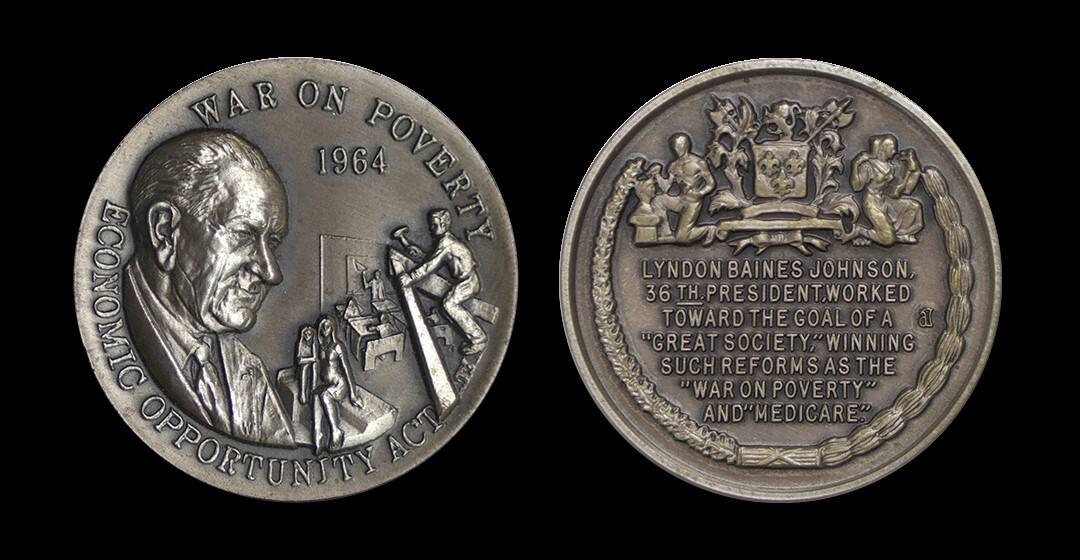


Back
Economic Opportunity Act Commemorative Medallion
A sterling silver medallion commemorating the 1964 Economic Opportunity Act. One side features an engraving of President Lyndon Johnson and small vignettes depicting a construction worker, a school classroom and a seated woman and child. The words "War on Poverty" and "Economic Opportunity Act" and the year 1964 are engraved around the illustrations. The reverse side of the medallion features a decorative insignia and coat of arms with an inscription that reads: "Lyndon Baines Johnson, 36th President, worked toward the goal of a 'Great Society,' winning such reforms as the 'war on poverty' and 'Medicare.'" The medallion was packaged in a commemorative set with a similar medallion commemorating President Harry Truman and the 1948 Marshall Plan.
Economic Opportunity Act Commemorative Medallion
1973
Metal
1/8 × 1 1/2 in. (0.3 × 3.8 cm)
The Sixth Floor Museum at Dealey Plaza
2022.017.0001.0003
This commemorative medallion was manufactured in 1973 by Wittnauer Precious Metals Guild, the collectibles arm of Wittnauer, a New York watch company founded by a Swiss immigrant in 1885. The company grew and diversified, ultimately making aviation and scientific equipment, cameras, compasses and collectibles in addition to their classic Swiss watches. The company was purchased by Swiss watchmaker Longines in 1950 and bought again by American watchmaker Bulova in 2001. As of 2022, the Wittnauer brand still exists as a luxury watchmaker. Wittnauer Precious Metals Guild was mostly active from the mid-1960s to the mid-1970s, serving as a competitor to mass market collectibles company The Franklin Mint, founded in 1964. Wittnauer produced an extensive presidential coin series that concluded with Richard Nixon. The company also manufactured a wide variety of commemorative coins or medallions that celebrated notable individuals (including Paul Revere, Betsy Ross, Jonas Salk, Walt Whitman and Martin Luther King Jr.), as well as historic events and achievements, including the California Gold Rush, the invention of the Motel T and the Gettysburg Address. This particular 1973 set included medallions commemorating the 1948 Marshall Plan, featuring President Harry Truman, and the 1964 Economic Opportunity Act, featuring President Lyndon Johnson. These medallions were exclusive to this set and did not duplicate the presidential coins featuring Truman and Johnson. The Economic Opportunity Act of 1964, the centerpiece of the Johnson administration's war on poverty, established the Office of Economic Opportunity to administer numerous federal programs aimed at eliminating poverty through improved living conditions, better education and enhanced economic opportunities for all Americans. -- Stephen Fagin, Curator

Economic Opportunity Act Commemorative Medallion
A sterling silver medallion commemorating the 1964 Economic Opportunity Act. One side features an engraving of President Lyndon Johnson and small vignettes depicting a construction worker, a school classroom and a seated woman and child. The words "War on Poverty" and "Economic Opportunity Act" and the year 1964 are engraved around the illustrations. The reverse side of the medallion features a decorative insignia and coat of arms with an inscription that reads: "Lyndon Baines Johnson, 36th President, worked toward the goal of a 'Great Society,' winning such reforms as the 'war on poverty' and 'Medicare.'" The medallion was packaged in a commemorative set with a similar medallion commemorating President Harry Truman and the 1948 Marshall Plan.
Economic Opportunity Act Commemorative Medallion
1973
Collectibles
Johnson, Lyndon B.
Washington, D.C.
Metal
1/8 × 1 1/2 in. (0.3 × 3.8 cm)
The Sixth Floor Museum at Dealey Plaza
2022.017.0001.0003
This commemorative medallion was manufactured in 1973 by Wittnauer Precious Metals Guild, the collectibles arm of Wittnauer, a New York watch company founded by a Swiss immigrant in 1885. The company grew and diversified, ultimately making aviation and scientific equipment, cameras, compasses and collectibles in addition to their classic Swiss watches. The company was purchased by Swiss watchmaker Longines in 1950 and bought again by American watchmaker Bulova in 2001. As of 2022, the Wittnauer brand still exists as a luxury watchmaker. Wittnauer Precious Metals Guild was mostly active from the mid-1960s to the mid-1970s, serving as a competitor to mass market collectibles company The Franklin Mint, founded in 1964. Wittnauer produced an extensive presidential coin series that concluded with Richard Nixon. The company also manufactured a wide variety of commemorative coins or medallions that celebrated notable individuals (including Paul Revere, Betsy Ross, Jonas Salk, Walt Whitman and Martin Luther King Jr.), as well as historic events and achievements, including the California Gold Rush, the invention of the Motel T and the Gettysburg Address. This particular 1973 set included medallions commemorating the 1948 Marshall Plan, featuring President Harry Truman, and the 1964 Economic Opportunity Act, featuring President Lyndon Johnson. These medallions were exclusive to this set and did not duplicate the presidential coins featuring Truman and Johnson. The Economic Opportunity Act of 1964, the centerpiece of the Johnson administration's war on poverty, established the Office of Economic Opportunity to administer numerous federal programs aimed at eliminating poverty through improved living conditions, better education and enhanced economic opportunities for all Americans. -- Stephen Fagin, Curator









